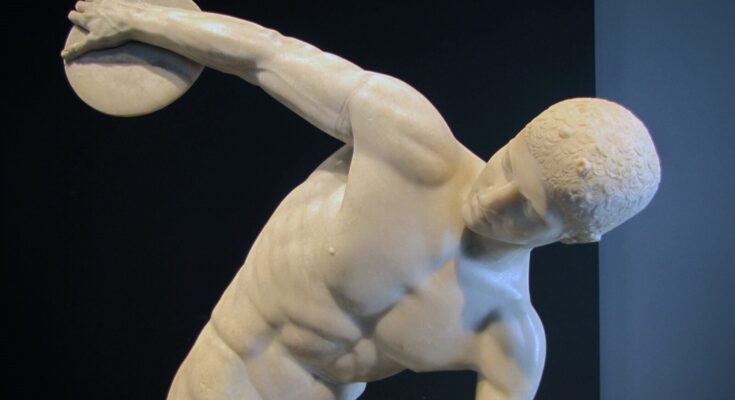For ancient Greek athletes, the Olympic Games represented the most important opportunity to exhibit their physical prowess and power. The Olympics were highly competitive because of the status bestowed upon victorious competitors.
As historian Donald G. Kyle points out, the ancient Olympics differed significantly from their modern counterpart. There were “no medals or second prizes, no team or women’s events, no winter or water sports, and no ideology of universal brotherhood and peace.”
However, much like today, wealth and social status were important dynamics at the Games. Winners looked forward to receiving riches and prestige both directly and indirectly, but entering the Games ________. As a result, the social and economic dynamics of the ancient Olympics offer clues about competitors themselves.
Ancient Olympic athletes came from varied backgrounds
All free male citizens were allowed to compete in the Olympic Games in ancient Greece. This meant that competitors at the Olympics, the three other Panhellenic Games, and the other athletic contests came from a wide variety of social backgrounds.
Polymnestor, who became an Olympic champion in the stadion race at the 46th Olympiad in 596 BC, was a humble shepherd from Miletus. His was so fast that it was said that he could outrun a rabbit.
At the other end of the socio-economic spectrum were the elites of ancient Greece, who generally had more time and resources to dedicate to training. For example, Alexander I, the king of Macedon and ancestor of Alexander the Great, competed in the 200-meter stadion race.
Although the Games were open to all free male citizens, having enough cash to pay for training certainly helped. Wealth could also be used to boost the profile of a victorious athlete, leading to further opportunities.
According to an academic paper in The Sport Journal, “The wealthy and powerful—kings, tyrants, members of the aristocratic elite—spent enormous sums to raise and buy and race their horses and chariots at Olympia and to pay poets such as Simonides, Bacchylides, and Pindar to sing their praises and to commission statues from the leading sculptors of the day.”

Big prizes awaited Olympic winners
There is somewhat of a misconception that victorious Olympic athletes did not receive money for their victories. Whilst there was indeed an emphasis on honor over riches at the ancient Games, this perception reflects late 19th-century attitudes to sports. At that time, the Olympics were being reimagined for the modern era.
The circumstances under which victorious Olympians received monetary or material prizes are not entirely straightforward. The greatest honor for an athlete was receiving the laurel wreath as a symbol of victory, but the winners also stood to gain other prizes, either directly or indirectly through the Olympics.
The term “athletics” has its roots in the Greek word “athlon,” meaning “prize.” In the earliest forms of competition, often held during funeral games like those for Patroklos, victors were awarded valuable items such as horses or bronze tripods.
Archaeological finds at Olympia have uncovered numerous bronze tripods dating from 1000 to 700 BC. However, it remains unclear whether these artifacts served as prizes for athletes or were offered as votive gifts.
Olympic athletes could typically look forward to receiving privileges, expensive gifts, and elevated social status in their home cities. After all, an Olympic victory was the ultimate honor and would contribute to the overall gravitas of the city-state. Privileges varied between individual city-states. In Sparta, for instance, victorious Olympians were given the honor of fighting alongside the king in the hippeus (royal bodyguard).
In Athens, as well as in other city-states, Olympic victors might be granted tax exemptions and receive cash prizes between about 100 and 500 drachmas. Lifetime membership in distinguished dining clubs and free meals might also be offered. Some of these prizes came from the state, whereas others were from wealthy patrons who made connections with famous athletes to enhance their gravitas.
Although it remains uncertain whether victorious athletes directly received any cash prize or monetarily valuable tokens at the Olympics, we can be sure that many winners did become wealthy after their victories at the Games.
In much the same way that corporate sponsors want to be seen supporting the top athletes at the Games today, wealthy ancient Greek benefactors were keen to bestow gifts upon Olympians who had successfully represented their city.



